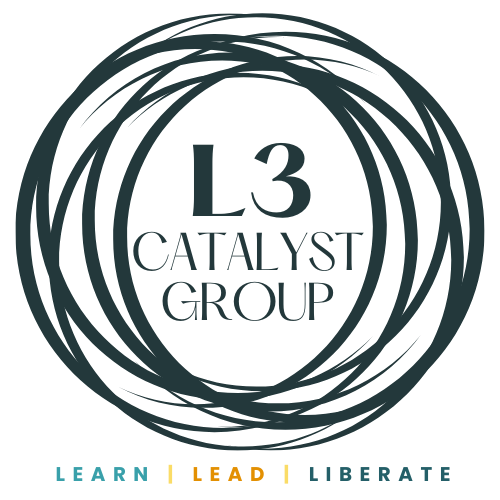
Liberatory Design Card Deck
Leaders often ask for concrete strategies and practices to work for equity individually and in teams.
Whether you are growing your ability to lead with equity or are an experienced disruptor of inequity these Liberatory Design Thinking Cards can help.
Special thanks to Tania Anaissie, Victor Cary, David Clifford, Tom Malarkey, and Susie Wise for creating and sharing your work with us.
“What is Liberatory Design? Liberatory Design is a process and practice to:
- Generate self-awareness to liberate designers from habits that perpetuate inequity.
- Shift the relationship between the people who hold power to design and those impacted.
- Foster learning and agency for those involved in and influenced by the design work.
- Create conditions for collective liberation.
What is this card deck? This deck is a resource to support your Liberatory Design practice. There are two parts:
- Mindsets: to invoke stances and values to ground and focus your design practice.
- Modes: to provide process guidance for your design practice. Also included are several Move cards that show some ways to use Liberatory Design.”
Liberatory Mindsets include a mindset title, a short description, an explanation of why the mindset is important, and examples of how the mindset can be used. Here is an example:
- Build Relational Trust: Invest in relationships with intention, especially across differences. Honor stories. Practice empathetic listening.
- Why? Relational trust is the glue in Liberatory Design work. When working across differences on difficult challenges, teams must invest in each other to develop trust, share openly, and collaborate authentically. If we are courageous in identifying and processing emotions with our team, we create opportunities for healing and prevent distortion of our work.
- How:
- Facilitate personal connection by inviting people to share what matters to them.
- Dedicate time and space for people to bring forward their whole selves and identities.
- Demonstrate the importance of nonjudgmental listening.
- Create space for community to reflect, express, and process thoughts and emotions.
- Cultivate a culture that invites dialogue and collective sense-making.
In their Introduction to Liberatory Design Mindsets, the authors share the following:
The Liberatory Design Mindsets invoke particular stances and values to ground the Liberatory Design process. These Mindsets catalyze creative courage, conversation, reflection, community-building, storytelling, and action.
These Mindsets aim to:
- Bring self-awareness and intention to our design practice.
- Help us recognize oppression in how we live and work and realize alternate ways of being and doing.
- Expand our frame of reference for what is possible.
- Inspire creative courage and set a foundation for liberatory collaboration.
The authors encourage us to "use these resources creatively to combine, sequence, and embody them in whatever ways that support our process."
I’ve used them to engage teams, grow equity-focused leadership practice, and frame mindsets for challenging brave mutual commitments.
How could you use these mindsets or modes in your leadership journey? Which ones speak to you? Which ones are the hardest for you to think about applying?
I’d love to hear your thoughts and examples of use!
Fellow leaders and learners, I wish you courage and resilience for the journey.


February 15, 2023




Comments